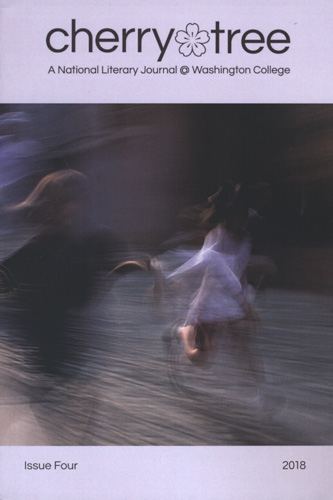Cherry Tree – 2018
Cherry Tree: A National Literary Journal @ Washington College invites writers to submit their best poetry, fiction, nonfiction, and literary shade.
Cherry Tree: A National Literary Journal @ Washington College invites writers to submit their best poetry, fiction, nonfiction, and literary shade. This last category, as described in the journal’s submission guidelines is a call for:
poems, short stories, or essays that throw shade at the institutions that have whitewashed our literature and history, be they laws or events of texts authored by dead old cisgender white supremacist misogynistic homophobes.
The specific instructions have resulted in pieces of valuable work that cast shade on harmful tradition, racism, discrimination, and the current administration while simultaneously putting society’s atrocities and negligence under a glaring lightbulb. The literary shade category runs the emotional gamut in a number of heart-rending ways. Julie Marie Wade’s affecting villanelle “The Game of Life” demonstrates learned behavior with regard to gender stereotypes and explains, “This is how it feels to be living in a typo,” tossing a specter of gloom over laws that prevent same-sex marriage. Jenn Leiker’s short story “Stitched,” an account of human compassion at an event bound by racist and misogynist institutions where the protagonist, Pranav, on his 30th birthday, makes the biggest tips of the year waiting on expats. The category, plus the equally high quality of the works of poetry, fiction, and nonfiction, make this issue significant and remarkable.
Samuel Taylor Coleridge famously defined prose and poetry: “prose—words in their best order; poetry—the best words in their best order.” In the case of the prose selections in this issue of Cherry Tree, prose and poetry definitions are interchangeable. The pieces of fiction and nonfiction show that skillful writers have chosen language carefully and purposefully in their quests to tell important stories.
One tightly crafted piece in this issue is Michelle McGurk’s “Uncle Peter,” which contains prose that is pleasantly disorienting while telling a family’s story. The branches of the family tree blow in different winds, and it becomes somewhat less important who is related to or sleeping with whom than it is that there is love and caring amidst the truths and lies told by each character. Felix is the narrative center who observes changes in the family structure in relation to Uncle Peter who comes and goes in the lives of Felix, his brother, and mother. Peter is the title character who moves in and out of the other characters’ lives and yet affects their lives the most. McGurk’s lyrical prose enchants, like a fairy tale, with dark themes lying just under the story of a family’s evolution.
Other tightly woven prose pieces appear throughout the issue, conveying urgent and timeless themes that affect human relationships and carve out different lives. Berry Grass explains that “there’s a difference between childhood and survival” and as a child, “my biggest dream was to escape,” in “Regent Spring,” a short nonfiction piece filled with associations, metaphors, and a bit of American history. In Ellen Davis Sullivan’s “The Lady Next Door,” everything that makes up a life dissolves in the face of encroaching dementia for Frances, the main character. Moving through daily scenes and memories, it becomes increasingly evident that Frances is having difficulty coping with the changes coming over her. During one conversation, “Frances just smiled, unable to follow it all. This happened more and more often lately.” Her mind attempts to fill in gaps in reality over a few days in an emotional and distressing story of what happens to someone afflicted with dementia. Meticulous, necessary prose is a common denominator in all of the selections in this issue.
The poetry selections also adhere to Coleridge’s definition. In so many of the poems, there is a sense of loss, be it family, memory, or belief. Jan Beatty’s “Stormday” asks “What would it be like to be stormless?” Evoking John Muir’s idea “That trees are travelers, in an ordinary sense,” the poem questions the associations Muir attributes to nature and proposes that life without storms “wouldn’t be life.” The questioning creates a tone of panic and despair, an anxiety for losing what we are bound to lose over time: associations, moments, minutes, and years.
In another poem of loss, “After Reading Sally Mann’s Memoir,” Jessica Murray explores memories captured in photographs that spawn new memories unrelated to the moment a photo was taken. The speaker reveals that “photography is mechanized forgetting. What’s fluid in time / reduced to a still point, obliterated.” When we think we are preserving memories we are in fact cementing our forgetting them, and the memory ”can be replayed to what use to no end.” One thematic conclusion is that we live mechanized lives that we are desperate to forget. The poems in this issue fill the voids in our lives with a communal feeling of loss and remembrance.
The compilation of work in this issue of Cherry Tree reaches a high standard of literary excellence with pieces of staggering importance to the realities of modern society in 2018. In inspiring creativity with attention to both form and function, each piece portrays aspects of the current state of the world and concedes to the damage that’s been done by institutions and individuals that has succeeded in rendering us helpless to its manifestations at so many different levels of our lives. There is a catharsis in this issue that feels as if it is still on the verge of fulfillment, yet we can hope that literature will allow us to purge the hurt, the violence, and the apathy from our lives sooner rather than later.
[www.washcoll.edu/centers/lithouse/cherry-tree]





